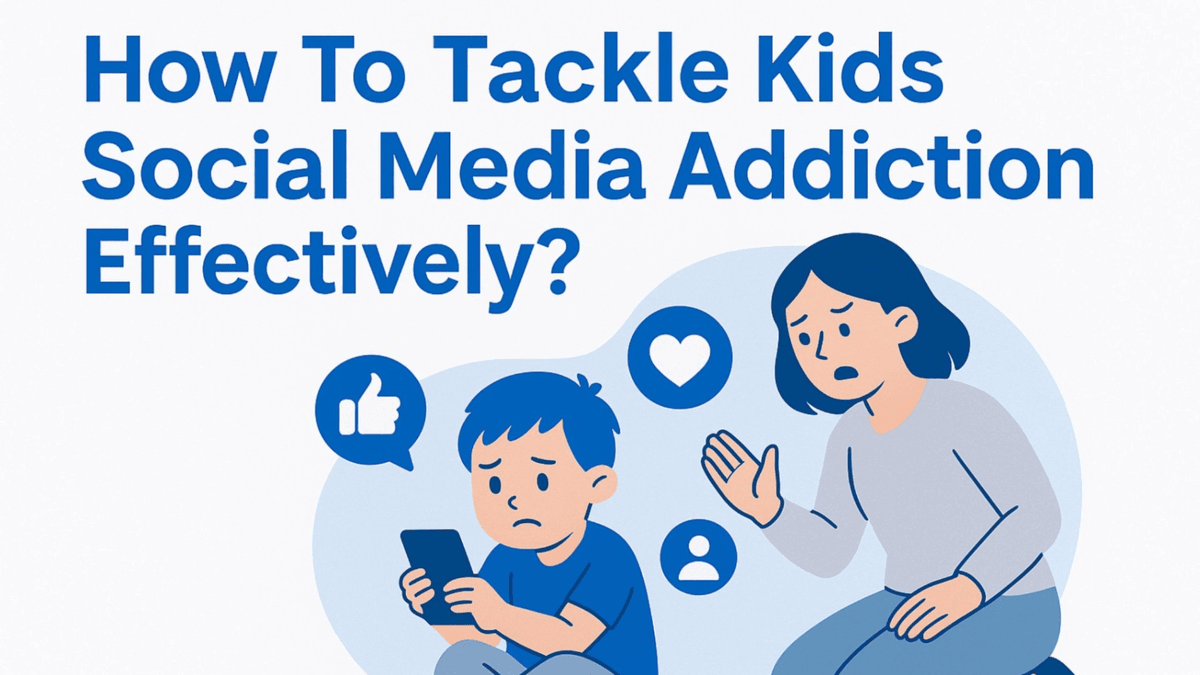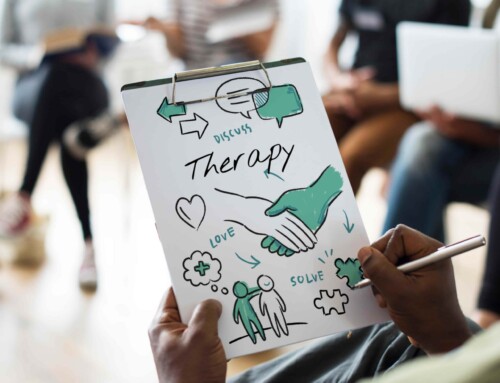Kids Social Media Addiction: What Parents Need To Know
TL;DR
|
|---|
Kids today are growing up with phones in hand and social media just a tap away. What starts as harmless scrolling or chatting with friends can quickly stretch into hours online, leaving many parents concerned about grades, sleep, and emotional well-being.
In fact, according to the American Academy of Child and Adolescent Psychiatry, kids and young people aged 8–18 in the United States spend about 7.5 hours a day using screens.
At Total Life Counseling, we often hear from parents who feel their child is “glued” to a device and unsure how to break the cycle. Our therapists help families create healthier digital routines, strengthen parent–child communication, and teach kids how to manage the emotional pull of constant notifications.
In this blog, we’ll look at what excessive use of social media in kids really means, why it happens, and what parents can do to manage it effectively.
What Makes Social Media So Addictive for Children and Teens?
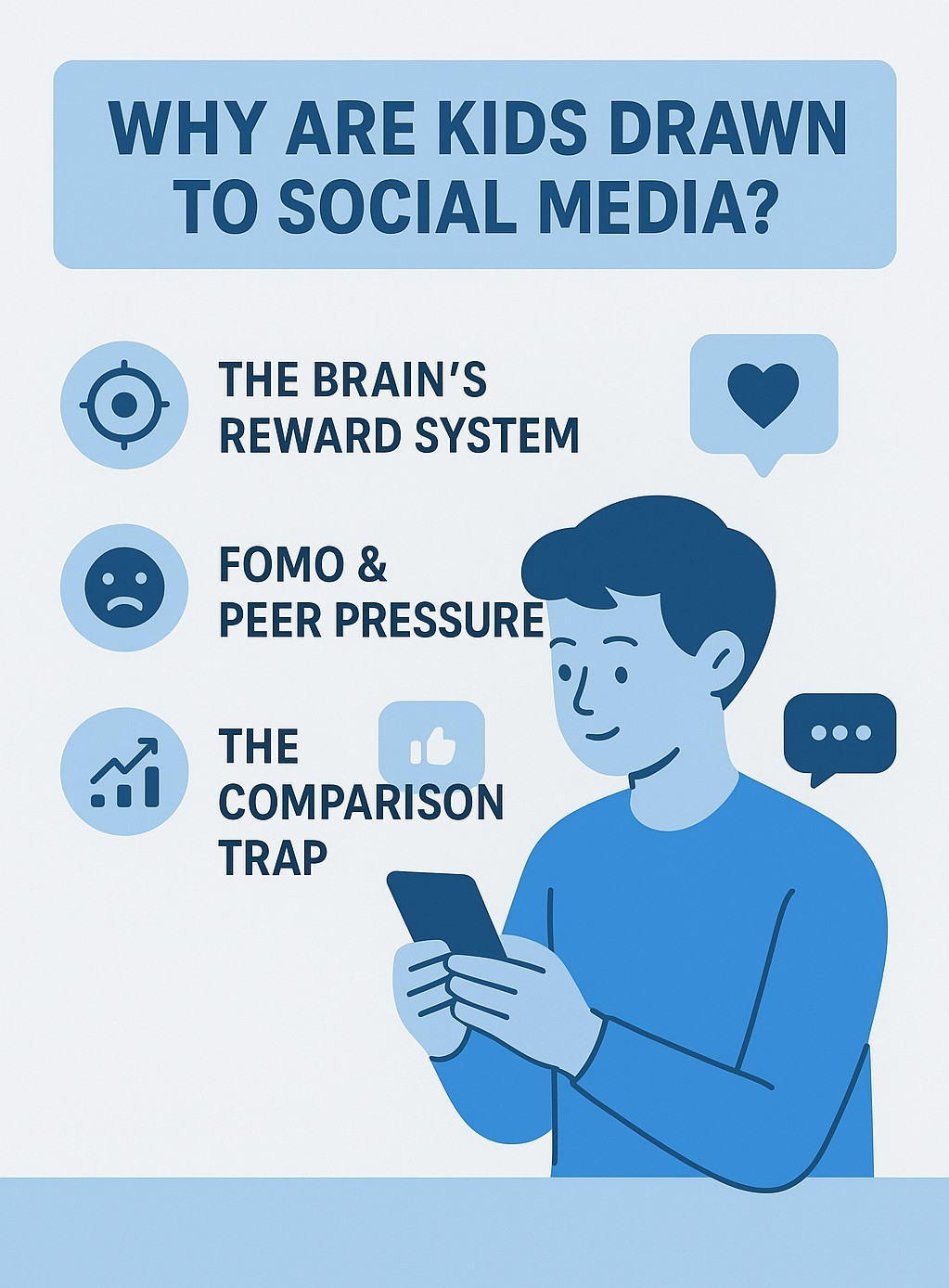
Kids aren’t just spending time on social media for fun. These platforms are designed to tap into deep psychological and social needs.
But while these motivations are natural, they can also open the door to compulsive use and unhealthy patterns, raising the question: why are kids addicted to social media in the first place?
Let’s look at some of the main reasons kids find it so hard to disconnect:
1. The Brain’s Reward System
Social media platforms are built to keep kids coming back. Every like, comment, or share triggers a small release of dopamine, the chemical in the brain linked to pleasure and reward.
Over time, this creates a loop where kids begin to crave the quick bursts of validation they get online, making it increasingly difficult to put their devices down. This explains how can kids get addicted to social media without realizing it.
2. FOMO & Peer Pressure
Alongside dopamine, social pressures play a powerful role. The fear of missing out (FOMO) makes kids anxious that they will be left out of what their friends are doing online.
Adolescents’ need for acceptance pushes them to stay active on the same apps as their peers, often at the cost of sleep, schoolwork, or real-life relationships.
3. The Comparison Trap
Social media also fuels comparison. Kids are constantly exposed to curated, idealized social media posts from friends and influencers. This can lower real-world self-esteem and increase the pressure to present a “perfect” version of themselves online.
The cycle of seeking validation to feel adequate often deepens their reliance on social media, creating the conditions for addiction.
If you’re concerned about your child’s screen time, Book a session with our counselor.
What Too Much Screen Time Really Does To Kids?
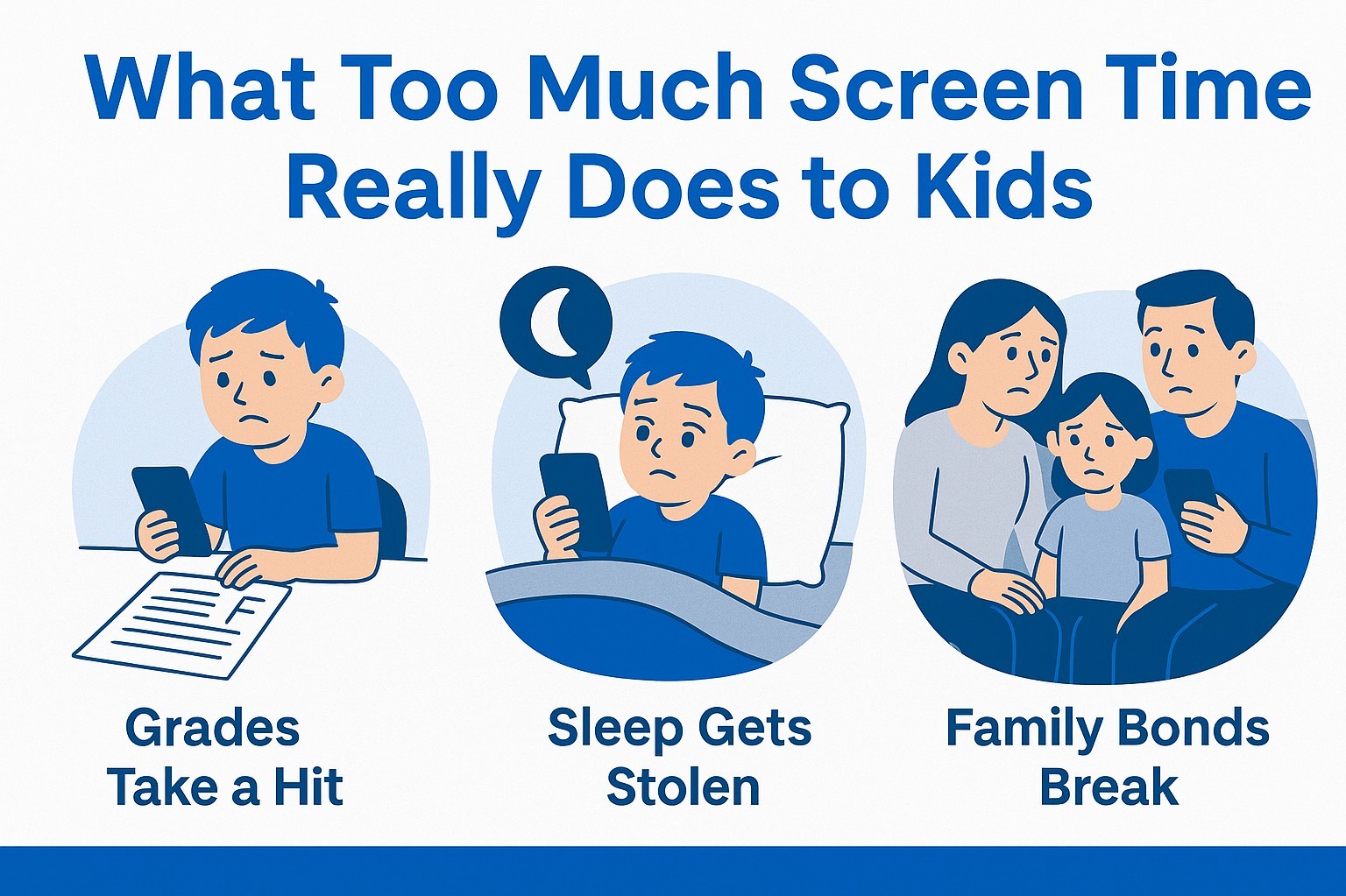
Excessive scrolling doesn’t just eat into homework time; it also affects sleep and relationships. This raises the ongoing debate of is social media bad for kids, especially when it starts shaping mood, attention, and family bonds.
Let’s look at how excessive screen time affects school, sleep, and relationships:
1. Grades Take a Hit
When kids spend hours scrolling, schoolwork suffers. Homework gets delayed or rushed, and constant notifications break focus.
Over time, this leads to incomplete assignments, slipping grades, and lower motivation to learn
2. Sleep Gets Stolen By Screens
Staying up late to scroll, chat with friends, or watch videos often pushes bedtime later than planned. The blue light from screens tricks the brain into staying alert, making it harder to fall asleep.
Late-night screen use doesn’t just cut into sleep hours, it also affects sleep quality, leaving kids tired in the morning, irritable, and struggling with memory and focus in class
3. Family Bonds Start To Break
Social media overuse can also create distance at home. Family dinners may be interrupted by phones, or kids may prefer their online world over real-life conversations.
They might lose interest in hobbies or sports they once loved, choosing screens instead. Over time, this shift can weaken family connections and leave kids feeling more isolated, even while “connected” online.
Also read: How much social media is too much for my teen?
How Does Social Media Overuse Affect Kids’ Mental Health?
The impact of social media is especially strong on developing minds. Constant comparison, peer pressure, and validation-seeking can fuel serious mental health concerns.
This is why many parents wonder should kids have social media so young, given its strong influence on developing minds.
Here are some common mental health issues:
- Anxiety and depression: The pressure to stay connected, gain likes, and keep up with peers often leaves kids feeling stressed, sad, or withdrawn.
- Low self-esteem: Instead of boosting confidence, the focus on presenting a “perfect” image online often makes kids feel inadequate in real life.
- Mood swings and irritability: Dependency on online validation can cause frustration or sadness when they don’t receive the feedback they expect.
If left unaddressed, these mental health conditions can grow more severe over time. Long-term risks linked to social media addiction include:
- Eating disorders fueled by body-image comparisons
- Substance abuse as a coping mechanism
- Self-harm behaviors driven by persistent low self-worth
Recognizing these risks early gives parents the chance to step in, set healthy boundaries, and support their child before the effects of social media addiction on kids become long-lasting.
Who Are At Most Risk?
Not every child who uses social media will develop an addiction, but some are more vulnerable than others. Factors like age, personality, and environment can increase the risk of developing unhealthy social media habits.
Some of the key risk factors include:
- Age: Teenagers are the most vulnerable group. During adolescence, the brain’s reward system is highly sensitive, making the dopamine “hits” from likes and comments feel especially rewarding and harder to resist.
- Personality: Kids who already struggle with low self-esteem, anxiety, or depression may turn to social media for validation or as an escape from negative feelings, which often deepens their dependency.
- Environment: Children without access to offline hobbies or social opportunities may rely on screens to fill that gap. Peer groups that value online popularity can also pressure kids to stay constantly connected.
Risk also rises when kids overshare personal information, making them vulnerable to online pressures and the broader risks of social media.
Is Social Media Controlling Your Child? Sign up now for our master Class and take back balance before it’s too late.
What To Watch For At Every Age?
The signs of social media addiction can look different depending on a child’s age:
- Younger Children (8–12): Losing interest in offline play, imitating online trends in daily life, and becoming secretive about device use.
- Teenagers (13–18): Declining grades, withdrawing from family or hobbies, extreme emotional reactions when phones are taken away, prioritizing their online persona over real-life identity.
Recognizing these patterns early gives parents the chance to step in before habits harden and affect mental health in the long-term. While teens are the most at risk, unhealthy patterns can begin much earlier.
For practical strategies, check out effective tips for reducing social media usage in teens.
How Can Parents Help Their Kids Use Social Media Wisely?
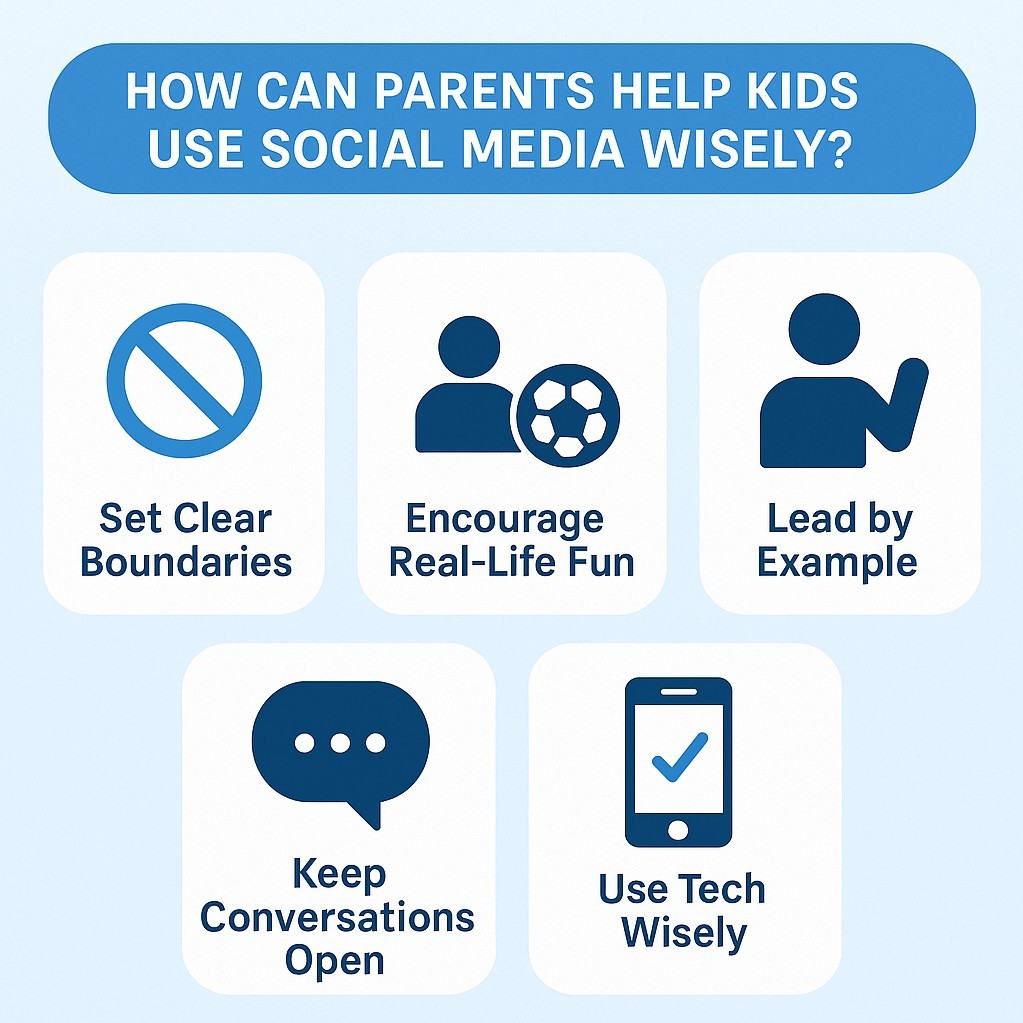
If your child’s social media use feels overwhelming, the good news is that you can take steps to help them regain balance. These strategies focus on guiding kids toward healthier routines, stronger offline connections, and a more mindful use of technology.
1. Create Healthy Digital Boundaries
Boundaries work best when they are simple, consistent, and agreed upon together. Talk with your child about when and where devices can be used, how much time is reasonable, and why limits matter.
Having clear rules around screen time, device-free zones like bedrooms or dinner tables, and offline hours before bed helps kids build discipline while reducing conflict.
2. Fill Their Time With Real-Life Fun
Kids are less likely to overuse social media when they have engaging alternatives. Encourage them to try self-esteem activities that bring joy and create lasting memories, such as sports, outdoor adventures, music, or art.
Family activities like cooking, playing games, or outings also provide connection and excitement, showing them that fulfillment doesn’t have to come from a screen.
3. Lead By Example
Children watch how parents use technology. If they see you constantly checking your phone, they’ll do the same. Model balance by putting devices away during meals, spending time offline together, and showing how you manage stress or boredom without screens.
When kids see healthy habits in action, they are more likely to adopt them.
4. Keep Conversations Open
Rules alone aren’t enough. Kids need to feel safe talking about what happens online, both the fun moments and the tough ones. Ask open-ended questions, listen without judgment, and discuss challenges like cyberbullying, comparison, or peer pressure.
Open communication builds trust and makes it easier for children to turn to you when they need support.
5. Use Tech Wisely To Balance Screen Time
Technology can be part of the solution if used wisely. Screen-time trackers and parental control settings help monitor usage, while apps that encourage mindfulness or breaks can support healthier routines.
These tools give kids gentle reminders to log off, making it easier to stick to boundaries and stay balanced.
Worried About Screen Time? Total Life Counseling Has Answers
At Total Life Counseling, we understand how overwhelming it can feel when your child seems “glued” to their phone. You’re not alone. Many parents share the same worries about grades slipping, sleep being lost, and family time fading away.
That’s where we step in. Our licensed therapists work closely with kids, teens, and families to:
- Help children manage the emotional pull of social media
- Build healthier routines and confidence offline
- Strengthen communication between parents and kids
- Address deeper concerns like anxiety, ADHD, or low self-esteem that may be fueling screen overuse
What makes our approach different is that we don’t just focus on reducing screen time. We look at the whole picture: your child’s mental health, your family’s unique dynamics, and the tools you need to bring balance back into your home.
If your child’s social media use feels out of control, we’re here to walk alongside you with compassion and proven strategies. Reach out to Total Life Counseling today.
Final Words
Social media may be a powerful force in your child’s life, but it doesn’t have to define who they are or how they grow up. When families take the time to set healthy boundaries, encourage offline passions, and keep conversations open, kids learn that they can enjoy technology without being controlled by it.
The truth is, what children remember most are not the hours they spent scrolling but the moments they felt seen, supported, and connected in the real world.
By showing up with patience and consistency, parents can help their kids find balance, build resilience, and rediscover the joy of life beyond the screen.
Frequently Asked Questions
How can I tell if my child is addicted to social media?
Look for signs of social media addiction such as excessive use that interferes with school or family life, anxiety when offline, and a loss of interest in other activities. Problematic social media use is defined by these negative impacts, not just the total screen time.
How to get kids off the addiction of social media?
You can get kids off the addiction of social media by setting consistent boundaries, introducing engaging offline hobbies, and creating tech-free times at home. Encourage open conversations about their online use, model healthy screen habits yourself, and use parental controls or apps to support balance.
Can social media addiction cause long-term behavioral changes in kids?
Yes, social media addiction can lead to long-term behavioral addiction and mental health problems. The negative impact of social media include increased anxiety, depression, and poor social skills in real life if the dependency is not addressed, affecting their development into adulthood.
What should I do if my child resists efforts to reduce their social media use?
If your child resists reducing their social media use, continue to foster open communication and start with small, mutually agreed-upon boundaries. If resistance persists and impacts their well-being, consider seeking guidance from mental health professionals to help establish healthier habits.
What social media are kids using the most?
Kids today mostly use platforms like Instagram, TikTok, Snapchat, and YouTube, while older teens may also use Discord, X (Twitter), and Facebook to stay connected with friends and trends.
Why should kids not have social media?
Kids should not have social media because it increases risks like cyberbullying, online predators, poor sleep, and low self-esteem from comparisons. Without guidance, the effects of social media on kids can damage mental health and healthy growth.
Are there differences between internet addiction and social media addiction in kids?
Yes. Internet addiction is a broad term that covers excessive use of online activities like gaming, browsing, or streaming, while social media addiction is a specific type focused on platforms like Instagram, TikTok, or Snapchat. Kids with social media addiction mainly crave likes, comments, and peer interaction, whereas internet addiction can stem from multiple online behaviors.
Filed in: Jim West, Video and Social Media Addiction
Share This Story, Choose Your Platform!
Total Life Counseling Center consists of Licensed Counselors, masters level therapists, Español counselors, Licensed Mental Health Counselors, business coaches, and image enhancement coaches who provide counseling for emotional, mental, physical and spiritual care including marriage, individual, family, substance abuse and more. TLC’s family, trauma and marriage experts have been interviewed on National and Local TV/Radio over 200 times for their expert advice on Fox News, OWN, WETV, ABC’s Medical Minute and more. Our skilled counselors are relational, approachable and specialists providing therapy services in the Central Florida area including: Orlando, Winter Park, MetroWest, Windermere, Dr. Phillips, East Orlando, Lake Mary, and Clermont, Boca Raton Florida, and Dallas, TX.

